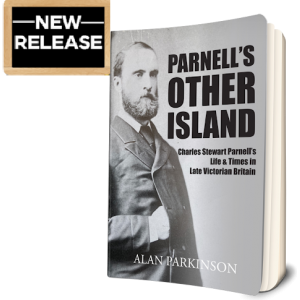Charles Stewart Parnell's Life & Times in Late Victorian Britain.
COMING SOON!
Parnell’s Other Island offers a fresh and revealing portrait of Charles Stewart Parnell, the great Irish nationalist leader of the late nineteenth century — a man whose life and legacy were shaped as much by England as by Ireland. An English-accented Wicklow landowner and formidable parliamentarian, Parnell moved with ease between two worlds: the political battleground of Westminster and the pastoral quiet of rural Kent; the fashionable promenades of Brighton and the rugged hills of his native Ireland.
Published 150 years after Parnell’s first election to Westminster, this book traces his remarkable journey from childhood in Ireland and schooling in Somerset to his leadership of the powerful Irish Parliamentary Party at the heart of Victorian politics.
Drawing on extensive documentary research, Parnell’s Other Island uncovers the complex interplay between Parnell’s Irish nationalism and his life within British society. It argues that his years in England, at once a source of inspiration, conflict, and tragedy, were as vital to his political formation as his Irish roots.
Author Bio
Dr Alan Parkinson is a university history lecturer and the author of numerous publications, especially in the areas of modern Irish political history and the social history of modern London. His publications include:
Belfast's Unholy War
Friends in High Places: Ulster's Resistance to Irish Home Rule, 1912–14
Election Fever: Ground-breaking Elections in Northern Ireland
A Difficult Birth: The Early Years of Northern Ireland, 1920–1925.
| Details | |
| Author | Alan F. Parkinson |
| Publisher | Eastwood Books |
| Publication Data | November 2025 |
| Format | Paperback |
| Subjects | General Interest |
PARNELL'S OTHER ISLAND:
- ISBN: 9781916742796
- Author(s): Alan F. Parkinson
- Availability: In Stock
-
€25.00
Tags: Parnell's Other Island: Charles Stewart Parnell's Life & Times in Late Victorian Britain

